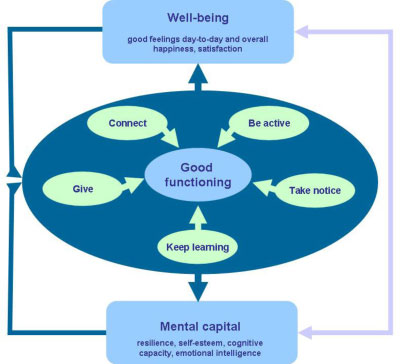Five Ways To Wellbeing
The Five Ways to Wellbeing is a set of evidence-based actions aimed at improving people’s wellbeing. They are simple things people can do in their everyday lives to promote their wellbeing and help prevent mental health problems.
CONNECT
With the people around you, with family, friends, workmates and neighbours. At home, work, school or in your local community. Think of connections as the cornerstones of your life and invest time in developing them. Building these connections will support and enrich you every day.
BE ACTIVE
Go for a walk or run. Step outside. Cycle. Play a game. Garden. Dance. Exercising makes you feel good. Most importantly, discover a physical activity you enjoy and that suits your levels of fitness and mobility.
TAKE NOTICE
Be curious. Catch sight of the beautiful. Remark on the unusual. Notice the changing seasons. Savour the moment, whether you are walking to work, eating lunch or talking with friends. Be aware of the world around you and what you are feeling. Reflecting on your experiences will help you appreciate what matters for you.
KEEP LEARNING
Try something new. Rediscover an old interest. Sign up for that course. Take on a different role at work. Fix a bike. Learn to play an instrument or learn to cook your favourite meal. Set a challenge you will enjoy achieving. Learning new things will make you more confident as well as being fun.
GIVE
Do something nice for a friend, or a stranger. Thank someone. Smile. Volunteer your time. Join a community group. Look out as well as in. Seeing yourself, and your happiness, linked to the wider community can be immensely rewarding and connects you to the people around you.
The Five Ways to Wellbeing were developed by the New Economics Foundation from evidence gathered in the UK government’s Foresight Project on Mental Capital and Wellbeing. This project, published in 2008, drew on state-of-the-art research into what creates and mainatins our wellbeing throughout life.
The Five Ways have now been used by health organizations, schools and community projects across the UK and around the world to help people take action to improve their wellbeing, whether as individuals or as communities

- Last updated on .
